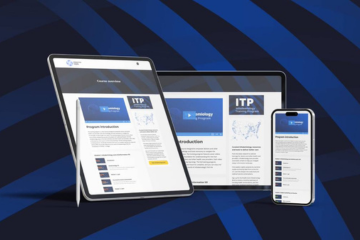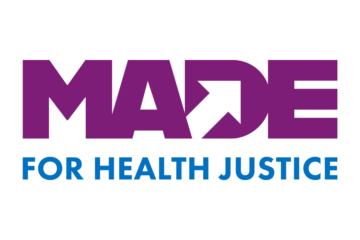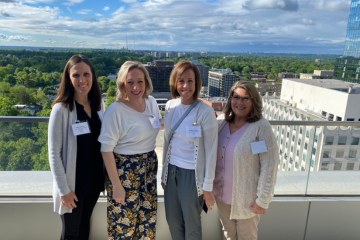
Beyond the four walls of the office building, businesses play a critical role in supporting the health of the communities where their employees live. The business community’s response during the COVID-19 pandemic made this dynamic clear. Businesses can engage with elected officials and public health leaders to support decision-making, policy development, and partnerships that support community health, both in times of crises and beyond—and benefit their bottom line. Going forward, companies can strengthen themselves against future public health crises by building on their recent experience and taking a more active role in community health.
Recently, the Health Action Alliance hosted a conversation with San Antonio Mayor Ron Nirenberg and San Antonio Metropolitan Health District Director Claude Jacob at a town hall for business leaders on “Strengthening Business Resilience Through Public Health.” This panel was moderated by Brittany Giles-Cantrell, Senior Program Officer at the de Beaumont Foundation. In the excerpts below, Nirenberg and Jacob offer actionable, impactful, and sustainable ways businesses can partner with local leaders to advance community health. You can watch the entire conversation here.
Below are excerpts that demonstrate how local leaders in San Antonio have invited and engaged business leaders prior to and during the pandemic to support community health, a foundation they look to build upon into the future.
Brittany Giles-Cantrell: Mayor Nirenberg, what does public health mean to you?
Mayor Nirenberg: Public health is our great denominator when it comes to how we’re judging the success of our city. We’re trying to achieve good public health outcomes for all of our community, and that’s why grounding ourselves in equity is such an important concept. We can see the challenge of historic disparity most clearly when it comes to public health outcomes. They correlate to all the other issues that we deal with as a city, whether it’s infrastructure maintenance, access to good schools and education, or overcoming food deserts. We see the outcomes of all of our policy initiatives based on whether or not the public health metrics are moving in the right direction or the wrong direction. Public health has become the lens through which we look at all of our city initiatives and actions.
Brittany Giles-Cantrell: What has been the role of business in leading public health efforts in San Antonio?
Mayor Nirenberg: When it comes to public health and community health, everyone has a role to play. The business community becomes extremely important in building partnerships and making sure that we’re reaching people where they are. Other than being at their residence, we’re reaching people most clearly when they are working. Working with the business community to be partners to our efforts, helping them understand the importance of our efforts, but also reaching the population that we serve, is critically important.
If you don’t do that, it becomes a liability. We have seen in communities across this country that when the business sector is not engaged and we are in the midst of a public health emergency, people get into a state of disarray, information gets unclear, and ultimately, it’s the health of individuals and families that ends up suffering, so [business] becomes an important partner in establishing policy and also implementing it.
Brittany Giles-Cantrell: How has your relationship with business evolved during the COVID-19 pandemic?
Mayor Nirenberg: It has strengthened. Businesses became the partners to help us establish good policy, and ultimately, be the ones to implement it.
In San Antonio, we established two very important task forces. One was a Health Transition Team of medical and public health professionals focused on the health aspects of the virus. We took [their] guidance and data and gave it to an economic transition team made up of business leaders from virtually every sector who could digest that information and help operationalize within their own businesses, whether they were grocery stores, restaurants, or movie theaters to protect the public, themselves, and their employees.
Businesses had a seat at the table, felt ownership of how we were tackling COVID-19 in our community, and felt responsible for the welfare of their employees and their customers. That’s where we want to be. Everybody has a role to play when it comes to public health and to give the community that kind of ownership and voice before, during, and after implementation of health policy is critically important. And I think that that had a lot to do with our relative success in combating COVID-19.
On giving businesses a seat at the table in public health policy from Meteorite on Vimeo.
Brittany Giles-Cantrell: What has your relationship with business looked like and how has it evolved in the last few years?
Director Jacob: COVID-19 has forced us to figure out how to get through this experience together. Agility has been our main asset in working with our public sector and private sector partners. COVID has exacerbated a number of social conditions, underscoring why it’s important to support the governmental public health enterprise to protect residents. Our discipline, sadly, has been woefully under resourced, but it’s an opportunity to tap into innovations and improved practices.
Brittany Giles-Cantrell: How have you seen businesses start to center equity in the community?
Mayor Nirenberg: To understand public health is to understand equity. When I became mayor in 2017, we adopted our city’s first equity agenda. We have an equity office that’s going through all of our city operations to ensure that we’re infusing a sense of understanding and addressing historical disparity in all our city initiatives.
We’re trying to make sure that people understand and harness this idea of restoring equity so that it doesn’t become trite or a catchphrase that people use but are staying true, committed, and using proper metrics and outcomes. Equity has become a centering concept, not just for the public sector but now within the business community. It’s becoming fully adopted, and that is because we have all felt the impacts of the public health crisis and public health is understood best through the lens of equity.
Brittany Giles-Cantrell: What lessons learned have you seen in this equity journey during the pandemic?
Director Jacob: We have an Office of Health Equity at Metro Health and a defined equity action plan. We’ve used the science of our work to do a better job of targeting marginalized parts of our community feeling the burden of generations of inequities. Across communities, Black and Brown folks are seeing the disproportionate burden of COVID-19 as a result.
It is about being more intentional with partnerships not just in the private sector, but with nonprofits and faith–based organizations. It requires us aligning our efforts, being very intentional in addressing the long standing and chronic burden, not just the acute episodes. It’s about making sure that we employ, adapt, and engage better ambassadors on the ground. We realized there was a better way to amplify our messaging especially in communities who have had different lived experiences over time. We really need to lean in even more as we go through this COVID-19 experience.
Brittany Giles-Cantrell: How can business support local government in both managing COVID-19 and improving community health in the long-term?
Mayor Nirenberg: First and most importantly, we need people at the table who will consider themselves partners in the process and demonstrate a level of trust. Business leaders are part of the process of creating policy that impacts themselves, their employees, and their customers.
The second is to commit to doing your part. We have to have business leaders helping us see all impacts of policies and working with us to implement those mitigation efforts. For example, through the Greater. SAfer. Together Pledge, our business leaders came up with a list of best practices and encouraged businesses to commit to those best practices that adhere to public health principles related to COVID-19 mitigation.
Ultimately, [we must] recognize that these issues are rooted and exacerbated in historic inequities going forward, even post–pandemic. We [must] incentivize good behaviors, health management, and wellness, which plays into people’s bottom line, and this will allow us to have a more robust and stronger economic recovery in the long run.
What do cities need from business? from Meteorite on Vimeo.
Director Jacob: [The pandemic] has exposed cracks in our broader health system. We revisited our departmental strategic plan and have upgraded that to align with a national blueprint to modernize the U.S. public health system. Our local priorities have to do with mental health, food insecurity, violence, shoring up our technology and infrastructure and access to care, but really at the end of the day, it’s about making sure that we move the needle on urban initiatives.
We will be engaging our broader business community so that we can adopt innovative practices as we implement this plan over the next few years. We are encouraging businesses to do their part to align our efforts, encourage their employees to get vaccinated, but also promote health and wellness, recognizing the behavioral health impact that this experience has had for the community. We are really trying to pivot in partnership and collaboration with the business community.
Leveraging partnerships on the ground from Meteorite on Vimeo.
Brittany Giles-Cantrell: What are the specific steps you would recommend businesses take to engage with public health?
Mayor Nirenberg: Trust is our most important tool in fighting a common enemy. We have to trust the people that we’re hearing from. We have to trust the leaders we have to lead us through it. We’ve got to establish that and work on that every single day.
One of the things that we did in San Antonio was model that, when there was information to share. The County Judge and I would be on the air on every single station, every single day, at 6:13pm. We would share the information that people needed about coronavirus. It was something that people could count on even through a turbulent and uncertain period of time. We would have our public health professionals there alongside us to give the more detailed data, our hospital folks, and experts with to deliver the information. It’s remarkable how many people still talk about that. Establishing trust and making sure that you’re bolstering trust at every turn is really important.
The second thing is collaboration. We obviously didn’t agree on every single step, but we tried to find common ground. We tried to make sure that we were moving together, and we tried to get as many folks alongside with us, and that goes for the business community.
Make sure that you’re establishing relationships. Reach out to your public health professionals, public health leaders, city leaders, and people around the community that are going to have an ability to lead people through a particular public health issue. You’ve got to be willing to partner.
Finally, we’ve got to deliberately break out of our silos and not get ourselves cornered into people who agree, talk like us, and work in the same sector. Every day that you break out of a silo, there is a new one being built. We’ve got to be cognizant of that and continue to break out of our comfort zones to make sure that we’re moving forward together.
Director Jacob: One key is the power of the trusted source, whether it’s the power of the pulpit, the influence of healthcare providers, or employers, recognizing that they do have influence in terms of what happens with their workforce.
Each one of us can reach out to others. Visit your friendly neighborhood health department, and reach out to your elected officials. There is a resource, Public Health Forward, with defined calls to action [for] elected officials and local health departments, and for those interested in supporting the governmental public health enterprise. You can use this as background reading, but also to connect with partners on the ground.
I truly believe it takes a village to raise a healthier community. There are national implications for how we get through not just the COVID-19 storm, but also understand the ongoing burden of chronic diseases. We’ve got a ways to go and partners in the business community can help us message, manage that information, and get it out to our workforce and our communities.
For a business perspective from this town hall event, check out this conversation between Kim Fortunato, President of the Campbell Soup Foundation and Stephen Massey, Managing Director of the Health Action Alliance, as they discuss the importance of Campbell’s community health investments to create shared value.




